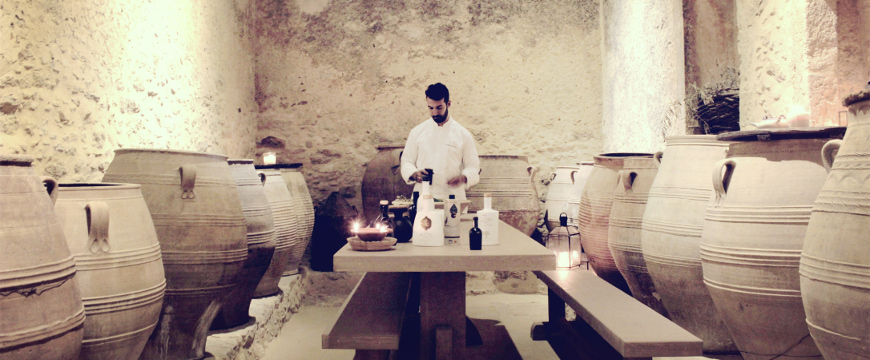Greek chef Vasilis K. Leonidou was judged the “Best Olive Oil Chef” in the world for 2017 by Flos Olei, the international olive oil guide from Italy. The guide also named the Kapsaliana Village Hotel restaurant where he is head chef 2017’s “Best Restaurant of the Year.” At the hotel in the olive groves near Rethymno, Crete, Leonidou discussed his goals.
Leonidou explained that Flos Olei personnel visited the Kapsaliana Village Hotel restaurant more than once in the guise of ordinary customers. They found it hard to believe that a chef on a Greek island would work with more than 45 olive oils from various countries, using them in his cooking and in tasting seminars with hotel guests, as well as helping to produce the hotel’s own extra virgin olive oil (EVOO). “It was surprising to them, but they gave us the award, and it was one of the best moments of my life.”
Growing up in his parents’ hometown of Agrinio, Greece, Leonidou starting cooking around age 9—“telephone cooking,” as he put it, since his mother gave instructions over the phone while she was at work. By the time he was 15, he was dreaming of becoming a chef. He did: after studying at Le Monde culinary school in Athens, he worked as a chef or executive chef in several restaurants in Athens, Agrinio, and Crete.
Leonidou told Greek Liquid Gold that a friend inspired his interest in extra virgin olive oil. “A good friend who visited me in a restaurant in 2010 tasted all my dishes and told me they were super dishes with super taste, but ‘you have a very bad olive oil.’ And he was right. It was my first time as a chef to have the opportunity to taste olive oil as trained tasters do,” guided by his friend, a Greek olive oil taster and “ambassador” in Germany. Realizing “I was a chef without knowledge about the most important product in Greece,” Leonidou decided, “I wanted to be an olive oil expert, to have knowledge of this liquid gold.”
So he turned to experts in Greece and Italy for seminars, earning the title Master and Sommelier of Extra Virgin Olive Oils in 2015. “But who,” he asks modestly, “is really master of the oils?” He prefers to call himself an Executive Olive Oil Chef, which is accurate “because I was one of the first chefs who really worked a lot with EVOOs.”
Now Leonidou both cooks with extra virgin olive oils and leads seminars to teach others to appreciate their flavors, uses, and health benefits. He educates schoolchildren, hotel guests, chefs, participants at the World Olive Oil Summit in Portugal--anyone who wants to learn. His goal is not to make more masters of EVOOs, “but more consumers and ordinary people who really know now why they must use extra virgin olive oil, and how to recognize it.”
For cooking, finishing, teaching, and restaurant customers’ use, Leonidou has an olive oil bar featuring 45 extra virgin olive oils from such countries as Italy, Spain, Portugal, Croatia, and of course, especially, Greece. Why so many? “Every olive oil has a personal character and taste.” Leonidou shared a few examples of extra virgin olive oil varieties he uses to bring out the best in specific dishes: marinated fruits with mint and Tsounati olive oil, cold tomato soup with crispy Armenian cucumber and Kolovi olive oil, and cheese ice cream with honey and Koroneiki sauce on the top.
Asked how Greek olive oil compares to Italian and Spanish olive oils, Leonidou responded, “we have more sweet olive oils with a great aftertaste. They are not as aggressive as Italian oil and some of the Spanish oils. As you can imagine, I’m also a fan of special oils from Italy, Spain, Portugal, and other countries, but for most consumers I think we excel, because it is easier for them to use a lot of Greek olive oil. We have great fruity, spicy oils that are also balanced in their taste.”
After studying in Athens and Italy, what brought this executive chef to the Cretan village of Kapsaliana where he now works? He considers it “unique in the world, a paradise, a historic place dating back to 1763, an old village with 15 buildings, three of them once olive oil factories. For me, it is also a paradise because I found a place that gave me the key to making gastronomy my way, always focusing on Cretan culture and gastronomy.”
The Kapsaliana Village Hotel emerged from the painstaking restoration and conversion of a village. Embracing the Arkadi Monastery church built in 1600, the original village developed around an olive oil mill after 1763, when the mill started attracting workers who built houses for their families there. Hotel architect and owner Myron Toupoyannis was careful to preserve the village’s traditional Cretan architecture during restoration of the stone houses with red tiled roofs, earning a Presidential Decree of “High Cultural Value” for the result.
Leonidou spends most of his time creating Greek and Cretan dishes for the hotel’s restaurant, combining fresh local products with some of the world’s best EVOOs. However, the executive chef leaves the kitchen at harvest time to help make the hotel’s own fresh olive oil. (Guests can also engage in agrotourism activities such as the olive harvest, depending on when they visit Crete.)
“One of the most difficult jobs, I think, is to be a farmer.” Leonidou has great respect for those “who spend hours and hours in the olive groves and fields.” Such respect is also evident in the hotel’s renovated olive mill, which is now a museum that helps Leonidou teach visitors how olive oil used to be made.
_________________________
Thanks to Vasilis Leonidou for the photos from the Kapsaliana Village Hotel.


